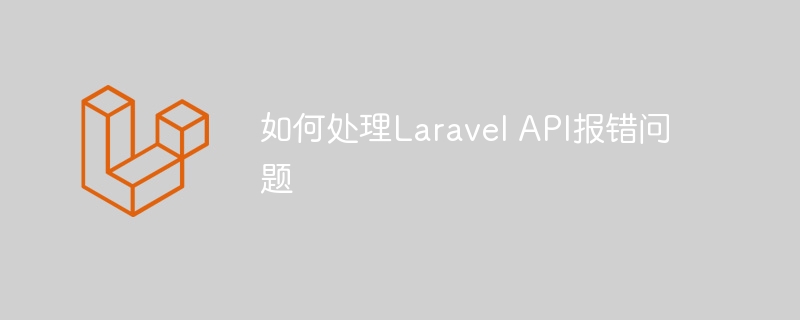

Title: How to deal with Laravel API error problems, specific code examples are needed
When developing Laravel, API errors are often encountered. These error reports may come from various reasons such as program code logic errors, database query problems, or external API request failures. How to deal with these errors is a key issue. This article will use specific code examples to demonstrate how to effectively handle Laravel API error issues.
In Laravel, we can effectively handle API error issues through exception handling and error handlers. First, we can customize the exception handler to capture various exceptions and return corresponding error information to the client. The following is a simple exception handler code example:
<?php
namespace AppExceptions;
use Exception;
use IlluminateFoundationExceptionsHandler as ExceptionHandler;
use IlluminateHttpJsonResponse;
class Handler extends ExceptionHandler
{
public function render($request, Exception $exception)
{
if ($exception instanceof SymfonyComponentHttpKernelExceptionNotFoundHttpException) {
return response()->json(['error' => 'Not found'], 404);
}
if ($exception instanceof IlluminateDatabaseEloquentModelNotFoundException) {
return response()->json(['error' => 'Resource not found'], 404);
}
return parent::render($request, $exception);
}
}When processing user requests, data validation is a common problem, we can use Laravel's validation processor to handle the validity of input data. If validation fails, we can return a JSON response containing error information. The following is an example of data validation error handling:
public function store(Request $request)
{
$validator = Validator::make($request->all(), [
'name' => 'required',
'email' => 'required|email',
]);
if ($validator->fails()) {
return response()->json(['error' => $validator->errors()], 422);
}
// 处理请求
}When performing database queries, you may encounter query failures. We can use Laravel's Exception handling mechanism to catch database query exceptions and return error information. The following is an example of database query error handling:
try {
$user = User::findOrFail($id);
} catch (IlluminateDatabaseEloquentModelNotFoundException $e) {
return response()->json(['error' => 'User not found'], 404);
}When making external API requests, we often encounter network connection problems or back-end service failures, etc. Condition. We can use the Guzzle HTTP client provided by Laravel to make external API requests and catch exceptions when the request fails through try-catch blocks. The following is an example of external API request failure handling:
try {
$response = Http::get('https://api.example.com/data');
$data = $response->json();
} catch (Exception $e) {
return response()->json(['error' => 'API request failed'], 500);
}Through the above code examples, we can see how to handle API error issues in Laravel, from exception handling to data verification There are corresponding solutions for errors, database query errors, and external API request failure handling. In actual development, we need to perform appropriate error handling based on specific situations to improve API stability and user experience. I hope this article can help readers better handle Laravel API error problems.
The above is the detailed content of How to deal with Laravel API error problems. For more information, please follow other related articles on the PHP Chinese website!




